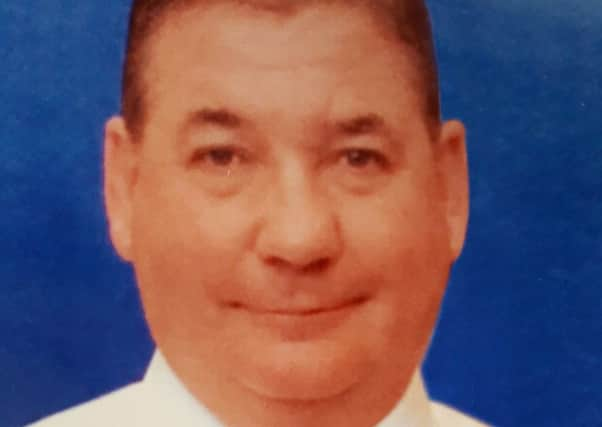Obituary: Murray Sinclair, lawyer at the heart of government who served six First Ministers


Murray Sinclair was a distinguished public servant and an outstanding lawyer who made a significant contribution to the government of Scotland.
Over the course of a remarkable 30 year career as a government lawyer, Sinclair served, with professional dedication, four Secretaries of State for Scotland, six First Ministers and nine Lord Advocates.
Advertisement
Hide AdAdvertisement
Hide AdSinclair attended Dundas Primary School and then Dollar Academy after gaining a bursary.
He went on to study law at Christchurch, Oxford, winning the Boulter Prize for law in his first year, an award given to a deserving student as chosen by the tutors.
After Oxford, Sinclair completed a degree in Scottish law at the University of Edinburgh. His first legal post was a traineeship with Dundas and Wilson before he took his first post as a government lawyer in 1988 at the then Scottish Office.
In 1987, Sinclair married Aileen, having known her since childhood. They were together for 27 years and along the way had two children, Cameron and Mhairi.
Sinclair was a great lover of music, something he has passed on to his children. At birthdays and Christmases, the children’s games such as pass-the-parcel were invariably played to the sound of Oasis and Radiohead, rather than the standard choices of Nelly The Elephant or The Teddy Bear’s Picnic.
He was with his current partner, Shirley, for nine years and with her continued to explore his love of travelling, particularly to Paris, which they would visit at least once a year.
He was a generous, intelligent, loving man with a great sense of humour. Not only an interesting man, but someone who always showed an interest in others, especially his family. Any time spent with his nearest and dearest almost always resulted – at some point or other – in Sinclair taking their hand in a vice-like grip; refusing to let go until bones were feared broken. Just one of the ways he showed he cared.
His legal career in government started in what was then the Office of the Solicitor to the Secretary of State for Scotland in 1988. The young solicitor’s talent was immediately recognised and, uniquely for that time, he was assigned from the outset to a policy advisory post.
Advertisement
Hide AdAdvertisement
Hide AdSinclair advised on criminal justice before becoming an instrumental part of the team that delivered devolution. His immense contribution during that time of constitutional change has been recognised in tributes from across the Scottish legal profession.
In 1999, Sinclair was promoted to the senior civil service and became head of the division advising on local government, environment, housing and countryside and natural heritage. In 2004 he transferred to head up the Constitution and Parliamentary Secretariat. In that role, Sinclair led a team combining lawyers and policy civil servants.
Eight years later he was appointed Solicitor to the Scottish Government and head of the Government Legal Service for Scotland. Remarkably, Sinclair is one of only two people who have held that position in the 20 years since devolution.
The position of Solicitor to the Scottish Government is a truly significant office within the devolved constitution, and it is a demanding one, which calls for the highest legal expertise and wise judgment, but also for acumen, leadership, sensitivity to the changing parliamentary and political context, understanding of the wider constitutional landscape in the UK and, for the moment at least, the EU, and personal and professional integrity.
After the election of 2007, Sinclair supported the incoming Ministers in the formation of the first post-devolution minority government. He advised them on the Scottish constitution – which suddenly, for understandable reasons, was no longer of interest only to constitutional lawyers.
Later, he was directly involved in the changes effected by the Scotland Acts of 2012 and 2016, as well as in the work which was undertaken in connection with the 2014 referendum on independence.
After the 2016 referendum on the UK’s membership of the European Union, Sinclair was deeply involved in work to address the consequences of the vote. He knew the impact of constitutional change on the law, on government, and on his staff; and his advocacy laid the groundwork for the changes needed to respond to the unprecedented challenges which that vote presents.
Sinclair cared deeply about his staff in all parts of the legal directorate. He was generous with his time in speaking with individuals, regardless of grade, about issues which were important to them. Over the last weeks, many have reflected on his personal kindness to them.
Advertisement
Hide AdAdvertisement
Hide AdA football fanatic, cinephile, culture vulture, voracious reader, political junkie, music lover, travel enthusiast, self-confessed food snob, and more recently – much to the bewilderment of his children – a lover of ballet; it seemed there were few things Sinclair wasn’t interested in.
Sinclair will be missed most of all by his family – in particular by Shirley, by Mhairi and Cameron, and by Kate, Clare and Beatrice. He will also be missed by many people in the Scottish Government and also across the wider Scottish legal profession who reflect on his life as a distinguished public servant, as an outstanding professional lawyer, and as a man who over his truly remarkable professional career contributed so much to the law and to the government of his country.
CONTRIBUTED